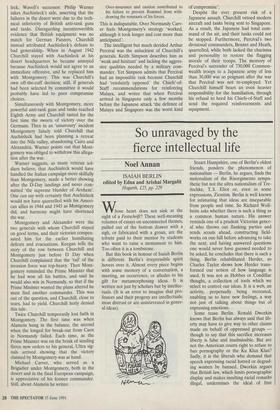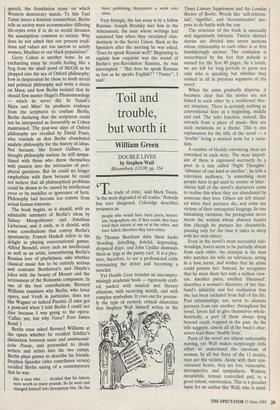So unravaged by the fierce intellectual life
Noel Annan
ISAIAH BERLIN edited by Edna and Arishai Margalit Hogarth, £25, pp. 229 whose heart does not sink at the sight of a Festschrift? These well-meaning volumes of essays on unconnected themes, pulled out of the bottom drawer with a sigh, or fabricated with a groan, are the tribute paid to their mentor by students who want to raise a monument to him. Too often it is a tombstone.
But this book in honour of Isaiah Berlin is different. Berlin's irrepressible spirit hovers over it. Almost every piece begins with some memory of a conversation, a meeting, an occurrence, or alludes to his gift for metamorphosing ideas. It is written not just by scholars but by intellec- tuals. (It is an error to imagine that pro- fessors and their progeny are intellectuals: most distrust or are uninterested in gener- al ideas).
Stuart Hampshire, one of Berlin's oldest friends, ponders the phenomenon of nationalism — Berlin, he argues, finds the nationalism of the Risorgimento sympa- thetic but not the ultra nationalism of Tre- itschke, T. S. Eliot or, even in some expressions, Zionism. Berlin is well known for intimating that ideas are inseparable from people and time. So Richard Woll- heim asks whether there is such a thing as a common human nature. His answer reminds one of a prudent Victorian gener- al who throws out flanking parties and sends scouts ahead, constructing field- works on one hill before advancing to take the next; and having answered questions one would never have guessed needed to be asked, he concludes that there is such a thing. Berlin rehabilitated Herder, so Charles Taylor shows how Herder trans- formed our notion of how language is used. It was not as Hobbes or Condillac thought, a collection of tools which we select to control our ideas. It is a web, an activity, perpetually being recreated, enabling us to have new feelings, a way not just of talking about things but of expressing emotions.
Some tease Berlin. Ronald Dworkin knows that Berlin has always said that lib- erty may have to give way to other claims made on behalf of oppressed groups — though to say that this sacrifice increases liberty is false and inadmissible. But are not the American courts right to refuse to ban pornography or the Ku Klux Klan? Sadly, it is the liberals who demand that speech expressing racial hatred or degrad- ing women be banned. Dworkin argues that British law, which limits pornographic display and makes insulting racial remarks illegal, undermines the ideal of free speech, the foundation stone on which Western democracy stands. To this Yael Tamir issues a feminist counterblast. Berlin tells us society must accommodate differing life-styles even if to do so would threaten the assumptions common to society. Why does he not admit that our present tradi- tions and values are too narrow to satisfy women, Muslims or our black population?
Gerry Cohen is another tease. In an enchanting essay he recalls feeling like a frog from the small pond of McGill as he plopped into the sea of Oxford philosophy; how in desperation he chose to study moral and political philosophy and write a thesis on Marx; and how Berlin insisted that he should first master Hegel's Phenomenology — which he never did. In `Isaiah's Marx and Mine' he produces evidence from the scriptures to confuse Berlin, Berlin declaring that the scriptures could not be interpreted as favourably as Cohen maintained. The post-war days of Oxford philosophy are recalled by David Pears, who reminds us that Berlin abandoned analytic philosophy for the history of ideas. Not because, like Ernest Gellner, he thought philosophy useless: he still sympa- thised with those who threw themselves with passion into the intricacies of peri- pheral questions. But he could no longer emphathise with them because he could not believe that all philosophical problems could be shown to be caused by intellectual error or by muddles or ignorance of facts. Philosophy had become too remote from actual human interests.
The book begins, as it should, with an admirable summary of Berlin's ideas by Sidney Morgenbesser and Jonathan Lieberson; and it ends, as it should, with some contributions that convey Berlin's spontaneity. Francis Haskell refers to his delight in playing conversational games. Alfred Brendel, every inch an intellectual as well as an artist, remembering Berlin's Russian love of playfulness, asks whether classical music has to be entirely serious and contrasts Beethoven's and Haydn's jokes with the beauty of Mozart and the seriousness of the Romantic composers. In one of the best contributions, Bernard Williams examines why Berlin, who loves opera, and Verdi in particular, does not like Wagner or indeed Puccini. (I once got a postcard when I told Berlin I could not dine because I was going to the opera: 'Callas, yes, but why Tosca? Pure James Bond.') Berlin once asked Bernard Williams at the opera whether he recalled Schiller's distinction between naive und sentimental- ache Poesie, and proceeded to divide writers and artists into the two camps. Berlin plays games to describe his friends. Stephen Spender (who contributes verses) recalled Berlin saying of a contemporary that he was
like a man who . . . decided that his talents were worth so many pounds. So he went and changed himself into threepenny bits. He has been publishing threepence a week ever since.
Very fittingly, the last essay is by a fellow Russian. Joseph Brodsky met him in the Athenaeum, the man whose writings had sustained him when they circulated clan- destinely in the Soviet Union. Back at the Spenders after the meeting he was asked, 'Does he speak Russian well?' Beginning to explain how exquisite was the sound of Berlin's pre-Revolution Russian, he was interrupted. "But does he speak Russian as fast as he speaks English?" "Faster", I said '.



















































 Previous page
Previous page